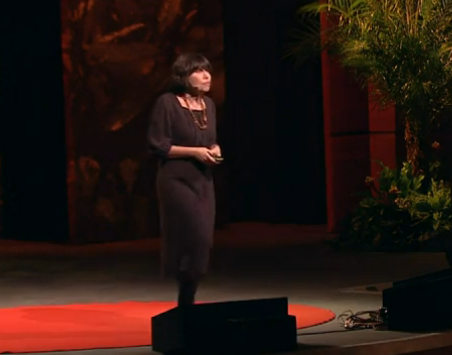And sort of the posterbirds for this idea are the birds up there.
圖片上的鳥可以證明這個觀點。
On one side is a New Caledonian crow. And crows and other corvidae, ravens, rooks and so forth, are incredibly smart birds.
左邊是一只新喀里多尼亞島的烏鴉。像烏鴉,其它雅科,渡鴉,和禿鼻烏鴉那類的鳥,都非常的聰明。
They're as smart as chimpanzees in some respects. And this is a bird on the cover of science who's learned how to use a tool to get food.
它們在一些方面就像猩猩一樣聰明。這只鳥登上了科學雜志的封面,它學會了如何用工具來取得食物。
On the other hand, we have our friend the domestic chicken. And chickens and ducks and geese and turkeys are basically as dumb as dumps.
另一張圖片上的鳥,是我們的朋友家養雞。雞,鴨,鵝,火雞,基本上可以說是笨得不能再笨。
So they're very, very good at pecking for grain, and they're not much good at doing anything else.
它們雖然很擅長啄食,但其它方面就不行了。
Well it turns out that the babies, the New Caledonian crow babies, are fledglings.
可這些幼鳥,我是說新喀里多尼亞島的幼年烏鴉,它們剛長羽毛。
They depend on their moms to drop worms in their little open mouths for as long as two years, which is a really long time in the life of a bird.
在長達兩年的時間里,它們完全依賴媽媽來喂它們蟲子,而兩年對于一只鳥的生命來說是非常長的一段時間。
Whereas the chickens are actually mature within a couple of months.
雞相對來說要成長的較快,只需要幾個月的時間。
So childhood is the reason why the crows end up on the cover of Science and the chickens end up in the soup pot.
烏鴉成為科學雜志封面的原因,是因為它們的童年,而雞的下場是變成鍋里的湯。
There's something about that long childhood that seems to be connected to knowledge and learning.
在它們兩年的童年里,有某些因素似乎和知識與學習有關系。
Well what kind of explanation could we have for this? Well some animals, like the chicken, seem to be beautifully suited to doing just one thing very well.
原因究竟是什么呢? 像雞這類的動物,好像只擅長把某一件事做好。
So they seem to be beautifully suited to pecking grain in one environment.
那件事就是在一個環境中啄食。
Other creatures, like the crows, aren't very good at doing anything in particular, but they're extremely good at learning about laws of different environments.
像烏鴉這種動物,不擅長做好某件事,但在適應不同的環境方面它們非常擅長。

And of course, we human beings are way out on the end of the distribution like the crows.
當然,我們人類在到了像烏鴉那種窮途末路時,我們比它們更能想到解決的辦法。
We have bigger brains relative to our bodies by far than any other animal.
我們的大腦和四肢的比例,目前還沒有任何動物能超過。
We're smarter, we're more flexible, we can learn more, we survive in more different environments, we migrated to cover the world and even go to outer space.
我們有更多的智慧和更強的適應性,可以學到更多知識,還能在更多不同的環境下生存,人類在地球各處居住,甚至上了外太空。
And our babies and children are dependent on us for much longer than the babies of any other species.
我們的孩子對我們的依賴的時間超過任何動物對父母的依賴,
My son is 23. (Laughter) And at least until they're 23, we're still popping those worms into those little open mouths.
我兒子現年23歲。在他們23歲之前,我們還會把食物送到他們的嘴里。











